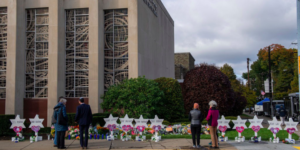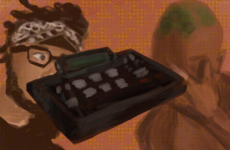On Saturday, October 27, when the first coverage of the shooting at the Tree of Life synagogue in Pittsburgh was being broadcasted, my parents and I were paying close attention. The massacre, later identified by news outlets as the deadliest attack on Jewish individuals in America, took place in Pittsburgh’s Squirrel Hill neighborhood, where my mother lived while attending graduate school at Carnegie Mellon University.
My mom told me stories of the hasidic community she spent four years in, how she frequently passed the synagogue when walking back to her apartment, how she once paused on the street during the High Holidays so she could hear the sound of the shofar, a special ram’s horn that is blown to commemorate the most holy week of the Jewish calendar.
While I have of course learned about anti-semitism from books and classes, I only realized how ignorant I was of its continued presence after the events of October 27, when a man entered a synagogue and killed eleven Jewish worshippers. I have been raised Jewish, but I have never before felt that my religion has the potential to put me in harm’s way. Perhaps growing up in an interfaith household on Choate Rosemary Hall’s campus has blinded me to the intolerance that continues to plague the Jewish community today. Maybe I have avoided anti-semitism because my religious identity is inconspicuous enough to those around me that, upon informing someone that I am Jewish, I am often met with a look of surprise. After speaking to other members of the Jewish community, both those of generations before me and those of my own, I realized how hard Jews in America have worked to raise a generation of children unafraid of practicing and expressing their religious beliefs.
The horrific events at the Tree of Life synagogue brought many people together, both Jewish and otherwise. My synagogue held a vigil a few days following the massacre, with people of all faiths filling the two levels of pews in the sanctuary in greater numbers than any bar or bat mitzvah, holiday service, or Hebrew school class I’ve ever attended there. Choate, too, organized a vigil against hate that took place on Friday, and students and faculty members alike gathered in the chapel to remember those lost in the recent onslaught of violence. In this environment, many began to share stories of anti-semitism and fear of such intolerance, and I realized how little time I’d spent discussing the topic.
Fear of hatred of the Jewish community is far from a problem of the past. Jewish preschools should not need to have guards standing outside their doors. Holocaust survivors should not need to feel like what they escaped decades ago is beginning again. My synagogue should not have needed a police officer to stand outside while the vigil took place. I should not have needed to see the flashing lights of his squad car to feel safe.
I have found many things about the massacre at the Tree of Life synagogue frightening, but I found one thing particularly distressing. Mr. Robert Bowers, the man who shot the eleven members of the Tree of Life synagogue, was not alone in his thinking. According to a New York Times podcast, his attack has been supported by members of an online platform known as “Gab,” on which Bowers posted anti-semitic material.
I understand that our nation is currently grappling with the line between free speech and hate speech, and citizens’ views often correlate with political identity. However, murder should not be a partisan issue. I find it despicable how quickly political figures and media outlets across the political spectrum began to ask what the shooting’s impact would be on the midterm elections. The events of October 27 are not just another factor to consider in an elaborate political plan to take congressional seats, and framing it as such is not only disrespectful and divisive, but also helps propagate the desensitization that allows such acts of violence.
The moment we began examining the effect of the Tree of Life massacre on Tuesday’s elections was the moment that it became a less universal concern. Politicizing the murder of human beings inhibits us from coming together to fight hate.





